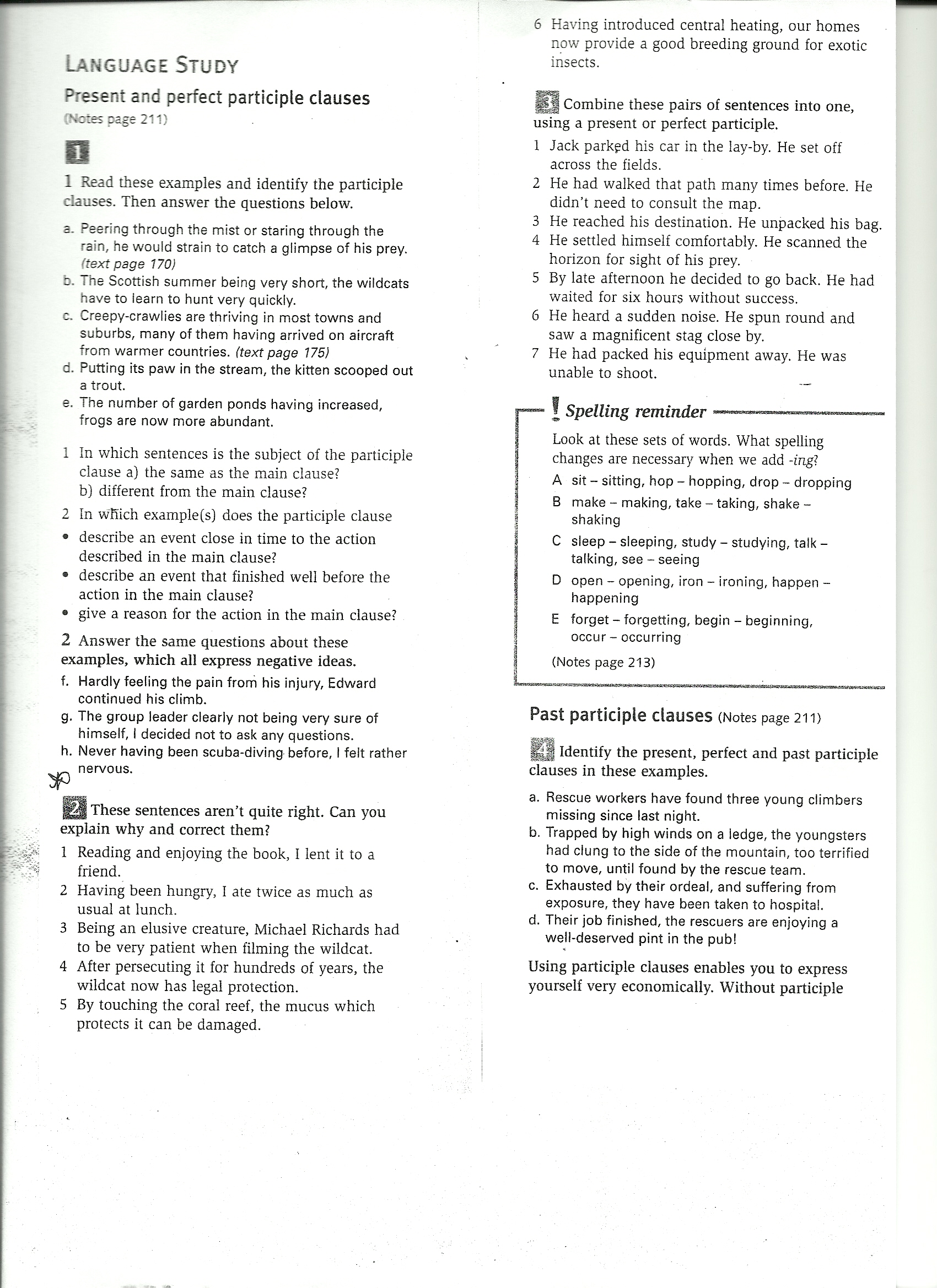davies0001


Language Study
Present and perfect participle clauses
(Notes page 211)

1 Read these examples and identify the participle
dauses. Then answer the questions below.
a. Peering through the mist or staring through the rain, he would strain to catch a glimpse of his prey. (text page 170)
b. The Scottish summer being very short, the wildcats have to iearn to hunt very ąuickly.
c. Creepy-crawlies are thriving in most towns and suburbs, many of them having arrived on aircraft from warmer countries. (text page 175)
d. Putting its paw in the stream, the kitten scooped out a trout.
e. The number of garden ponds having increased, frogs are now morę abundant.
1 In which sentences is the subject of the participle clause a) the same as the main clause?
b) different from the main clause?
2 In wKich example(s) does the participle clause
• describe an event close in time to the action described in the main clause?
• describe an event that finished well before the action in the main clause?
• give a reason for the action in the main clause?
2 Answer the same ąuestions about these
examples, which all express negative ideas.
f. Hardly feeling the pain from his injury, Edward continued his climb.
g. The group leader clearly not being very surę of himself, I decided not to ask any questions.
h. Never having been scuba-diving before, I feit rather nervous.
These sentences aren’t ąuite right. Can you
explain why and correct them?
1 Reading and enjoying the book, I lent it to a friend.
2 Having been hungry, I ate twice as much as usual at lunch.
3 Being an elusive creature, Michael Richards had to be very patient when filming the wildcat.
4 After persecuting it for hundreds of years, the wildcat now has legał protection.
5 By touching the coral reef, the mucus which protects it can be damaged.
6 Having introduced central heating, our homes now provide a good breeding ground for exotic insects.
HU Combine these pairs of sentences into one, using a present or perfect participle.
1 Jack parkpd his car in the lay-by. He set off across the fields.
2 He had walked that path many times before. He didn’t need to consult the map.
3 He reached his destination. He unpacked his bag.
4 He settled himself comfortably. He scanned the horizon for sight of his prey.
5 By late afternoon he decided to go back. He had waited for six hours without success.
6 He heard a sudden noise. He spun round and saw a magnificent stag close by.
7 He had packed his equipment away. He was unable to shoot.
— * Spelling reminder —..................
Look at these sets of words. What spelling changes are necessary when we add -ing?
A sit - sitting, hop - hopping, drop - dropping B make - making, take - taking, shake -shaking
C sleep - sleeping, study - studying, talk -talking, see - seeing
D open - opening, iron - ironing, happen -happening
E forget - forgetting, begin - beginning, occur - occurring
(Notes page 213)
Past participle dauses (Notes page 211)
UJ Identify the present, perfect and past participle
clauses in these examples.
a. Rescue workers have found three young climbers missing sińce last night.
b. Trapped by high winds on a ledge, the youngsters had clung to the side of the mountain, too terrified to move, until found by the rescue team.
c. Exhausted by their ordeal, and suffering from exposure, they have been taken to hospital.
d. Their job finished, the rescuers are enjoying a well-deserved pint in the pub!
Using participle clauses enables you to express
yourself very economically. Without participle
Wyszukiwarka
Podobne podstrony:
skanowanie0065 (5) 11.2.6. What a teacher needs to know to teach grammar: H Pattem and form, e.g. th
File0023 2 Read the text and match the headings in the box with the paragraphs (A-D). industry intro
31 Creative u-leaming: Complex ICT Use at the Masaryk Uniyersity Language Centre and structural plan
BUFFALO c Start InstallationSelect your language Please select your language and press the [Start] b
LICOLAB Language, Information, and Communication Laboratory Faculty of Arts, Pavol Jozef
• work leads to morę work, traffic between death and life, absence and presence, language and realit
screenh (31) © Phoxel Tourist Aid (By: Yaman Roumani) V Search for a country and display the languag
CCF20110611�031 ;7 ;7 r; I Handout Metliodology Ts have to take the responsibility for their languag
Davies0001 oA Rock and a Hard Place THE Northern Rock fiasco is fast becoming Labour s "Black W
31008 img469 (6) Language focus Much, many, a lot (of) Look at the sentences and complete the inform
więcej podobnych podstron